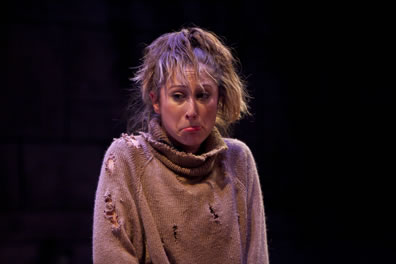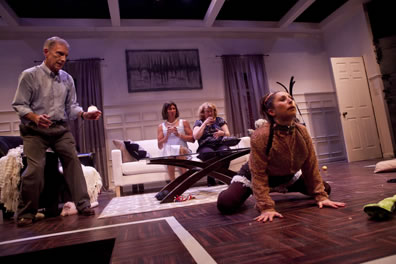Sylvia
Rrrrr-Wroof! Wroof! Rrr-Wroof! Errooo-Wroof!
By A.R. Gurney
NextStop Theatre Company, The Industrial Strength Theatre, Herndon, Va.
Thursday, November 13, 2014, second row, center of studio theater
Directed by Doug Wilder

Sylvia (Sherry Berg), an apparently abandoned dog, awaits the verdict from Kate on whether she will be allowed to stay with Greg who brought her home from the park in NextStop Theatre's production of A.R.Gurney's Sylvia. Photo by Rebekah Purcell, NextStop Theatre.
Here's your word for today: anthropocentrism. That is the tendency of people to assign human attributes to animals, aligning what we see in their behavior with human emotions, concepts, and characteristics. It's the habit we have of thinking our cats are evil, our dogs are sad, our snakes are loyal, and our goldfish are mad that we haven't cleaned their tank. Photographer Tim Flach's book, More Than Human, utilizes anthropocentrism to instigate debate on man's relationships with nature and animals merely by presenting his subjects in formal portraits. You might see a venerable grandmother, a savvy CEO, or a mischievous toddler, but in fact the photo is just a panda, a mandrill, or a panther.
Anthropocentrism is the foundation on which A.R. Gurney builds his 1995 play Sylvia about a dog named Sylvia who inserts herself into the home of a middle-age couple and sends their marriage into a rocky crux. The dog doesn't merely have human attributes; Sylvia is human. Played by Sherry Berg in the Doug Wilder-helmed production at NextStop Theatre in Herndon, Va., Sylvia carries on conversations with her people, occasionally dropping into French (a clue to her breed) and movie references.
But make no mistake, Berg's Sylvia is all dog. She bounces around the New York City apartment when excited, she torpedoes the crotch of a guest with her nose, she leaves a puddle on the floor, out is her favorite word, and when she's in heat she's an unabashedly hyperactive slut with not only her best friend Bowser but people and park benches as well. At the dog park, she listens as Greg (Phil Bufithis) meanders meditatively until finally, with the "whatever" attitude of a teen-ager, Berg's Sylvia says, "I've got to check my messages" and dives under the bench sniffing the ground around it. When she sees a cat in the distance, Sylvia lets lose a hilarious cannonade of profanity; it's exactly the way my dog used to react upon seeing a cat, and now I know that she was barking trash talk so vulgar it alone earns Sylvia an M for Mature rating.
But, then, the F-bomb is an important word in this play and is even attributed to Shakespeare at one point. Shakespeare, in fact, is a key off-stage character in Sylvia (as is Bowser, a dog belonging to Greg's new friend at the park). For, though anthropocentrism is the concept that drives the play's plot and its six on-stage characters, Sylvia is really about communication: not just the words we use but what's really spoken beneath and above our verbal communications.
After all, is it Sylvia really talking here, or is she speaking the thoughts of Greg and his wife, Kate (Gayle Nichols-Grimes)?
Greg and Kate are empty-nesters recently moved from the suburbs into a well-appointed downtown apartment (scenic design by Ruthmarie Tenorio with lovely time-of-day lighting by AnnMarie Castrigno for the interiors and the park bench to one side of the stage). English teacher Kate, with her newly earned master's degree, is trying to establish a Shakespeare program for inner-city junior high schools. Her socialite friend describes hearing how Kate has been "roaming around Harlem reciting Shakespeare," and Kate displays that habit in the play, often pausing in the middle of the action to quote from The Bard's plays to the audience. Greg takes an afternoon off from work after an argument with his longtime boss, and while he is sitting in a park, Sylvia (the name on her tag), seemingly abandoned, runs up to him and stakes a claim to his heart. The play begins with Greg bringing her home even though Kate "Doesn't like surprises" (she doesn't like dogs much, either). As Greg's infatuation with Sylvia grows, Kate engages in psychological warfare with the pooch, insisting she's being cruel to be kind (Hamlet, Act III, Scene Four). At one point, Sylvia and Kate square off on all fours on the floor, snarling threats at each other trying to establish the alpha female of the household.
Sylvia, though, is merely the flashpoint of conflict between two people in a relationship already adrift—they just don't realize that. After raising their children and sending them to college, Kate now has an opportunity to pursue her own career. Greg, on the other hand, has grown weary of his job. He used to sell "things," but as he rose up the ladder, things turned into concepts, and he has now been asked to apply his sales skills to dealing in derivatives. Derivatives aren't real to him; Sylvia is real. "I have a need," he says. "What need, I'm not sure, but I have a need." Kate, on the other hand, is living almost entirely in the pursuit of high concept, though she frames teaching Shakespeare "in all his majesty" to junior high hip-hop aficionados as a practical way of improving their language skills. It must be noted here that the one word she won't allow in her home is the F-word, and Greg is beginning to use it with more frequency.
Greg is warned not to give the dog a woman's name because he'll start thinking of her as a woman. Greg rightly argues that Sylvia was the dog's given name, but the name ends up having more importance to Kate, anyway: "Who is Sylvia?" she cynically sings from The Two Gentlemen of Verona, having become the Julia in Proteus Greg's affections. Naturally, the more Greg becomes infatuated with Sylvia, the more Kate does, too, but in extreme opposition to Greg's fondness for the dog. Though her old school friend Phyllis keeps trying to plan a dinner party when visiting the apartment, Kate can't get off the subject of Greg and that dog and ends up drinking too much as she does so. Greg and that dog get home and inadvertently chase Phyllis from the apartment, leading Kate to observe, "I may be sauced, but I know a hawk from a handsaw; Hamlet, Act II, Scene Two."
The play reaches a level of absurdity in the marriage counseling scene. Again, Kate blames everything on the dog, whom she accuses of eating her annotated copy of All's Well That Ends Well (wink-wink), even though the counselor, Leslie, tries to establish the dog as a metaphor for other issues in the marriage. But Kate won't let it go, prompting Leslie to probe whether Greg's relationship with Sylvia has become physical. "Oh no," Kate says: "Then it would be an affair, and any woman worth her salt can handle that." When Greg gets his turn with Leslie and begins talking relationship dynamics, it takes the counselor a while to realize that the "she" he is referring to is Sylvia, not his wife: it is the dog who is hard to read, who sometimes seems friendlier to others than to him, and who has the cute butt that sashays as she strolls down the street turning heads. Although his boss, his wife, and even Bowser's owner, Tom, encourage Greg to seek psychological help, ultimately it is Leslie—after using his or her androgyny to try to exhibit to Greg that perception is the foundation for communication—who goes off the deep end in this scene (Christopher Herring's portrayals of Leslie, Phyllis, and Tom, are collectively and singly courageously funny).
While the humans can't seem to get on the same wavelengths—"Lord, Lord, how this world is given to lying! Henry Fourth, Part One," notes Kate—Greg and Kate don't get Sylvia, either. Greg wants to learn more about her life before she ran up to him in the park that first day. It's not enough that he is her god, he wants to know why. But she won't reveal any of her past to him: so like a dog, you know. He doesn't fully grasp what it means for her to be in heat and that "getting her fixed" is really breaking her. Notably, when he's showing off the tricks she can do, Sylvia tells him flatly she doesn't want to roll over, but he keeps insisting and she does it "this one time," but isn't happy about it. Kate, of course, insists she knows Sylvia and what she's really up to. But, as Sylvia points out in the end, the one Kate should strive to know is Greg and understand why he wanted Sylvia in their lives—not just his life.

Sylvia (Sherry Berg, front) doesn't really want to, but she prepares to roll over on the command from Greg (Phil Bufithis, left) for Phyllis (Christoper Herring) and Kate (Gayle Nichols-Grimes) watching from the couch in the NextStop Theatre's production of A.R. Gurney's Sylvia. Photo by Rebekah Purcell, NextStop Theatre.
In the end, Kate seemingly wins, and Greg finds a new home for Sylvia. But the dog's favorite toy has gone missing, and though Kate insists Sylvia should have it, Greg has given up looking for it. Only after he leaves the apartment with Sylvia does Kate find the toy, literally, hidden in their marriage, whereupon she quotes Shakespeare dropping the F-bomb—the first truly applicable thing Shakespeare has said the whole play—and all's well that ends well.
Certainly, there are lessons in communications here: how to truly feel each other's meaning rather than merely hearing each other's words, how the connection between beings is often times more important than the purpose for connecting, and how Shakespeare is much more than words, words, words. His language creates images in the mind, sounds in the ear, murmurs in the heart; his language forms intricately vivid characters and our own thoughts; his works are a dynamic cultural touchstone. Then again, as Kate quotes Shakespeare (Twelfth Night, Act III, Scene Four), "If this were played upon a stage now, I could condemn it as an improbable fiction." Ultimately, Sylvia is about watching a human acting as a dog.
Berg's Sylvia, whom we learn is a Labrador-standard poodle mix, first enters wearing torn jeans and shaggy brown sweater; after grooming, she appears in a frou-frou jacket and fur-lined shorts over brown tights and slippers; at the end she's outfitted in a stylish, brown waist jacket and boots (Kristina Martin is the costume designer). Berg immediately wins over the audience with her limber antics and rambunctious energy, and she keeps the laughs coming even as she matures into a responsible dog. It takes an athletic actress to run, hop, and bounce on her knees as well as her feet; it takes an acrobatic actress to pirouette in the living room and squat while her cute butt wags; it takes a brave actress to play a dog in heat and go all gangsta on a cat out in the audience; and it takes a talented actress to drop into impersonations on a whim and then stare up at Greg with complete devotion.
If anthropocentrism is a state of mind in which we see dogs as human, Berg has turned that notion on its head as we see this human as a dog. But it is no matter; let Hercules himself do what he may, the cat will mew and dog will have her day. Hamlet, Act V, Scene One.
Eric Minton
November 18, 2014
Comment: e-mail editorial@shakespeareances.com
Start a discussion in the Bardroom



 Find additional Shakespeareances
Find additional Shakespeareances